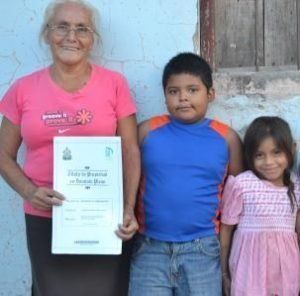The land ownership system in Honduras is complicated and technical, often shifting potential landowners between government agencies and requiring dozens of forms. This leaves those most vulnerable to losing their land least able to obtain a title for it. People who are able to navigate the system can claim ownership of the land where others have lived for years; suddenly residents face steep rents or evictions from these supposed owners.
“I can have something I say is ‘mine,’” Lopez said, “But when I go to the bank, they’ll say, ‘I’m sorry, but it says here you didn’t pay.’” Without the legal title, Lopez says, “You can lose what’s yours.”
Lopez tried to obtain a land title for the home in her nephew’s name where she has been living. She understood the security that owning land gives, but though she was willing to start paying, it wasn’t clear who she was supposed to pay.
While one branch of the government told residents to stop paying, another office continued to charge them. By the time the government had sorted out who had to be paid, the payments had accrued interest and put residents even farther from their titles.
For someone like Francisca Lopez, who only has a 1st-grade education, the process can seem almost impossible to navigate. “We didn’t read the papers we signed,” Lopez said. “We didn’t know what we were signing.” But she kept fighting for what she knew was hers.
Things finally began to change, Lopez said, when “Someone from the Association for a More Just Society came to work with us.” ASJ (formerly known as AJS) lawyers and social workers helped to sort out the legal status of Los Pinos residents and offered legal counsel and assistance. As an unbiased party, they were able to help residents get on track to make the payments that made the houses legally theirs.
And in August, Lopez finally got her long-awaited title. With her new knowledge, she has joined an ASJ-supported community group dedicated to helping others receive the titles to their own land. This group educates people on why titles are important and assists people in legally becoming owners of the land where their homes are built.
But land titles are about more than just ownership. They give a sense of permanence and stability to a community, assuring residents that the land will be there for their children and grandchildren. Now, if you ask Francisca Lopez where she’s from, she won’t give the place where she was born or grew up. “We are from the capital,” she says of her 13 children and countless grandchildren. The title she’s holding gives her the assurance to say, “We’re from here now.” After years of questions, this is the answer that means the most.



















